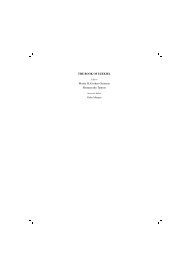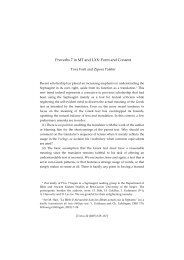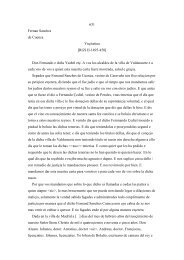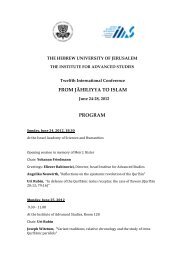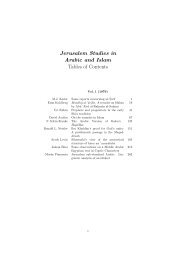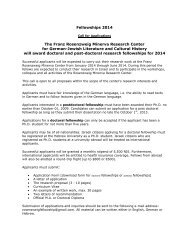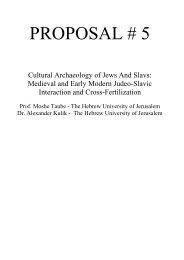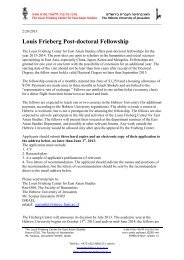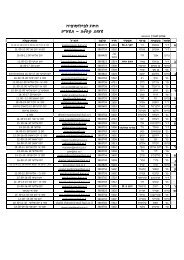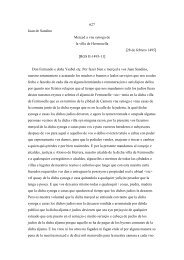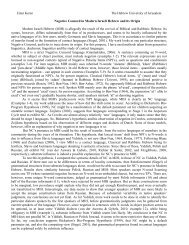Baber Johansen
Baber Johansen
Baber Johansen
You also want an ePaper? Increase the reach of your titles
YUMPU automatically turns print PDFs into web optimized ePapers that Google loves.
48<br />
50<br />
51<br />
52<br />
53<br />
54<br />
55<br />
56<br />
57<br />
58<br />
59<br />
60<br />
61<br />
62<br />
63<br />
64<br />
65<br />
66<br />
But see the text of the Pater Noster: Pater noster, qui es in caelis, sanctificetur<br />
nomen tuum. Adveniat regnum tuum. Fiat voluntas tua, sicut in caelo et in terra.<br />
AbÙ Bakr MuÎammad b. AÎmad b. AbÐ Sahl al-SarakhsÐ, UÒÙl al-SarakhsÐ ed. Abu<br />
l-WafÁÞ al-AfghÁnÐ (Beirut: DÁr al-MaÝrifa, n.d.), vol. I, pp. 32-33 on God’s<br />
entitlement to the believer’s performance of the acts of worship; ibid., pp. 44 on the<br />
legal effects of God’s command; pp. 60-69 on God’s command as the determining<br />
factor of the ethical quality of the required act; KÁsÁnÐ, BadÁÞiÝ, vol. I, p.127, 129: all<br />
obligatory acts of worship (ÝibÁdÁt) are the result of God’s command and, therefore,<br />
require the declaration of intent (niyya) to fulfill them as acts entirely dedicated to<br />
God.<br />
D.M. Dunlop, s.v. "al-BÁdjÐ," The Encyclopaedia of Islam. New Edition vol. I<br />
(Leiden and London: Brill and Luzac, 1960), pp. 864-865.<br />
AbÙ al-WalÐ al-BÁjÐ, IÎkÁm al-fuÒÙl fi aÎkÁm al-uÒÙl ed. ÝAbd al-MajÐd al-TurkÐ<br />
(Cairo: DÁr al-Gharb al-IslÁmÐ, 1407/1986), p. 309.<br />
Ibid., p. 310.<br />
E. Chaumont, s.v. "Al-ShÐrÁzÐ," in The Encyclopaedia of Islam. New Edition, Vol.<br />
IX (Leiden: Brill, 1997), pp. 481-483.<br />
AbÙ IsÎÁq al-ShÐrÁzÐ, Al-LumaÝ fÐ uÒÙl al-fiqh ed. MuÒÔafÁ AbÙ SulaymÁn al-NadawÐ<br />
(ManÒÙra: DÁr al-Kalima li l-nashr wa l-tawzÐÝ, 1997/1418), p. 73-74. See also the<br />
French translation by Eric Chaumont: Le Livre des Rais illuminant les fondements<br />
de la comprehension de la Loi. Traité de théorie légale musulmane. Introduction,<br />
traduction annotée et index par Eric Chaumont (Berkeley: University of California<br />
Press, The Robbins Religious and Civil Law Collection, 1999), p. 179-180.<br />
George Makdisi, Ibn ÝAqÐl. Religion and Culture in Classical Islam (Edinburgh:<br />
Edinburgh University Press, 1997), pp. 17-53.<br />
AbÙ al-WafÁÞ ÝAlÐ b. ÝAqÐl b, MuÎammad Ibn ÝAqÐl, Al-WÁÃiÎ fÐ uÒÙl al-fiqh<br />
(Beirut/Stuttgart: Franz Steiner 1996), part I, p. 19.<br />
Ibid., part I, p. 36.<br />
SarakhsÐ, MabsÙÔ, vol. III, p.54.<br />
Ibid., vol. III, pp. 54-55.<br />
Ibid., vol. III, p.61.<br />
SarakhsÐ, UÒÙl, vol. I, p. 62.<br />
Heinz Halm, s.v. "Al-¬ushayrÐ," The Encyclopaedia of Islam. New Edition (Leiden:<br />
Brill, 1982), vol. V, pp. 526-527.<br />
MuÎyÐ al-DÐn Ibn Sharaf al-NawawÐ, al-MajmÙÝ sharÎ al-Muhadhdhab ed.<br />
ZakariyyÁÞ ÝAlÐ YÙsuf (Cairo: MaÔbaÝat al-ÝÀÒima, n.d.), vol. I, p. 29.<br />
That this attitude is fairly general can also be seen in the work of Zayn al-ÝÀbidÐn<br />
b.IbrÁhÐm Ibn Nujaym (1520-1565, Egypt) who in his al-AshbÁh wa l-NaÛÁÞir Ýala<br />
madhhab Abī ÍanÐfa al-NuÞmÁn (Beirut: DÁr al-kutub al-Ýilmiyya, 1980/1400), p. 21,



